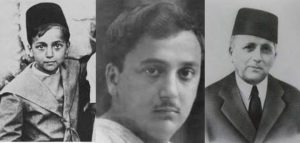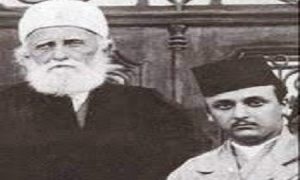Considering Shoqi Effendi’s succession, the Baha’is are divided into 3 groups. The reformist Baha’is are assuming Abdul Baha’s will as forged. Another group abolishes it. Most Baha’is have accepted the correctness and lack of the will abolishment but they are questioning about Baha and Abdul Baha’s chastity. However, the following story is testifying the unwillingness of Abdul Baha towards Shoqi Effendi since his childhood!
Even based on those Baha’is texts who have accepted Shoqi Effendi’s succession after Abdul Baha, Abdul Baha has been unwilling towards Shoqi Effendi since childhood.
After the second leader of Baha’ism, Abdul Baha’s death his daughter and Shoqi Effendi’s mother claimed for finding a will in her father’s house basement. In the will which was called the tablets of wills the succession of Shoqi Effendi has been specified.[1]
Confronting the will, the Baha’is were divided into three groups:
Group one: This group believes that the origin of the book the tablets of wills attributed to Abdul Baha is absolutely forged and the Baha’is following this belief were called Reform Baha’i faith. The reformist Baha’is are led by Frederick Glaysher, today.

Frederick Glaysher
Group two: This group is of close relative of Abdul Baha and Shoqi Effendi and Baha’ism dignitaries. They believe that the will attributed to Abdul Baha has been written before his death. They believe that Abdul Baha wrote the will when he thought Jamal Pasha was going to kill him and Shoqi Effendi was just 3 years of age, but he regretted later on.
Group three: This group who id in majority. They believe that Abdul Baha trampled the forged prophet of Baha’ism’s will and he elected Shoqi Effendi instead of introducing Muhammad Ali (the other offspring of the forged prophet of Baha’ism) as his successor.

Of course, Shoqi Effendi considered the tablets of wills as really important and the supplement of the book Aqdas[2]. When Shoqi gained power, he trampled the principle of affection and kindness[3] and boycotted those who opposed his succession violently and called them small-pox, artful, ignorant, crow, foolish, erratic, covenant breaker foxes, shit, dead corpse, bats, bastard, selfish, inferior, hyena, felon, the ignorant wander bird and etc.![4]
[۱] Refer to Abbas Effendi, the tablets and the wills, Pakistan, Sterling publishing house, 1960 A.D. pp. 11-12.
[۲] Refer to Houshang Fath A’zam, the Baha’i universal discipline, Canada: the Baha’i knowledge institute, the 2nd edition, 1995, p. 26.
[۳] Refer to Abbas Effendi, the Sermons, Germany, the national assembly of the faith works, the national institute of the faith press, 127 Badi’a, Vol. 2, p. 146.
[۴] Refer to Shoqi Effendi, the blessed writings addressing the eastern disciples, Germany: The national assembly of publishing the faith works, 1992 A.D., pp. 105, 108, 116, 132, 136, 137, 142, 189, 191, 192, 320; Muhammad Zarqani, Badayeul Athar, The electronic copy, Vol. 1, p. 321 & 322; Shoqi Effendi, Badi’a century, translated by Nasrullah Mawaddat, Nowrouz 101, Vol. 3, p. 353; Ishraq Khawari, Rahiq Makhtoum, the national assembly of publishing the faith works, 103 Badi’a, Vol. 2, pp. 722- 730.






